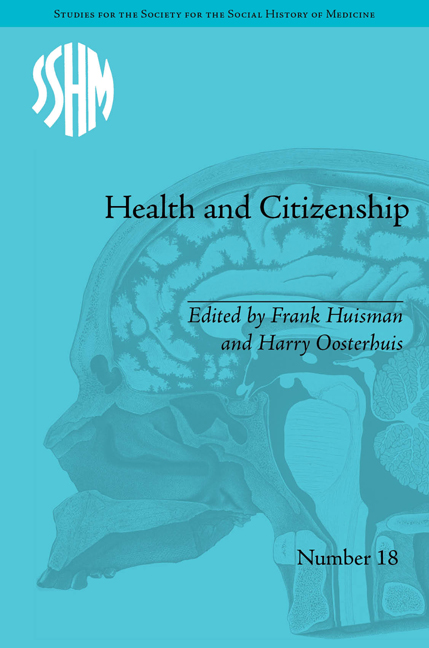Book contents
- Frontmatter
- CONTENTS
- Acknowledgements
- List of Contributors
- The Politics of Health and Citizenship: Historical and Contemporary Perspectives
- Part I Liberal Citizenship and Public Health
- Part II Social Citizenship: Health in the Welfare State
- Part III Neo-Republican Citizenship: Health in the Risk Society
- 8 Neo-Republican Citizenship and the British National Health Service since 1979
- 9 Struggling with Science and Democracy: Public Health and Citizenship in the Netherlands
- 10 Underwriting Citizenship: The Introduction of Predictive Medicine in Private Insurance
- Notes
- Index
10 - Underwriting Citizenship: The Introduction of Predictive Medicine in Private Insurance
from Part III - Neo-Republican Citizenship: Health in the Risk Society
- Frontmatter
- CONTENTS
- Acknowledgements
- List of Contributors
- The Politics of Health and Citizenship: Historical and Contemporary Perspectives
- Part I Liberal Citizenship and Public Health
- Part II Social Citizenship: Health in the Welfare State
- Part III Neo-Republican Citizenship: Health in the Risk Society
- 8 Neo-Republican Citizenship and the British National Health Service since 1979
- 9 Struggling with Science and Democracy: Public Health and Citizenship in the Netherlands
- 10 Underwriting Citizenship: The Introduction of Predictive Medicine in Private Insurance
- Notes
- Index
Summary
The fear, amongst some, that medical examinations in insurance may create some imperfection cult, in line with the propaganda of the rights of the imperfect to have their place under the economic sun and that it will be difficult for the imperfect to sustain themselves economically due to insurance medical examinations, is in general unfounded.
During the expansion of the private insurance business at the end of the nineteenth century, the practice of medical underwriting in private insurance became a subject of public debate. Since then, the issue has virtually disappeared from the public agenda. Medical risk selection has been accepted as a routine step in the application procedure for private life insurance, while medicine's gatekeeper role in insurance has rarely been criticized. The legitimacy of this practice rests in the scientific medico-actuarial dealing with risks via the development of actuarial science, mortality tables, medical expertise and technologies. The rise of predictive medicine, however, has prompted new debates on the issue of medical selection in private insurance, bringing the relationship between medicine and insurance back into the foreground.
Over the past decade the potential of genetics for understanding health and disease in radically new ways has been widely discussed. Genetic researchers anticipate that it will be possible to test for a variety of susceptibility genes and consider appropriate prevention strategies.
- Type
- Chapter
- Information
- Health and CitizenshipPolitical Cultures of Health in Modern Europe, pp. 209 - 226Publisher: Pickering & ChattoFirst published in: 2014



